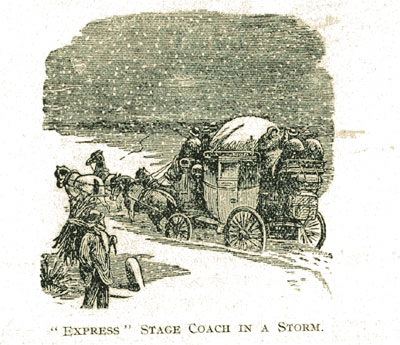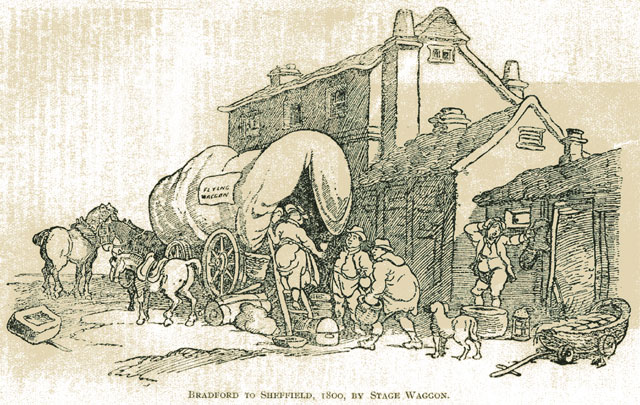
| Transportation in Yorkshire
| |
| HOME | |
| Land Introduction | |
| Life in Yorkshire | |
| The Weaving Industry | |
| Crime in Yorkshire | |
| Transportation
Up until the end of the 1700s travelers avoided the barren wilderness in the hill country around Bradford, roads were bad and full of ruts and trade between the towns was by pack house or wagon The pious offering of chapels at bridges was a means of paying for the maintenance of the bridge. Clothiers traveled from their hometown to the market towns to sell their cloth. They either walked with their cloths on their heads or used pack hourses called, galloways. See Life in Yorkshire and Weaving in Yorkshire now or at the bottom of the page. By the time of Benjamin Law in the early 1800s larger clothiers, like Benjamin, went to the major cities such as London both to sell their wares and to buy raw materials. Stage couches first came into use in England in 1640, and in 1658 one ran twice a week from London to York, in four days, for eleven shillings. In 1836 coach made the same journey of 197 miles, in twenty hours, including stoppages. Later many clothiers went overseas looking for other markets for their goods. Benjamin sent his son John to the US and eventually went himself when John did not return. See Benjamin Law now or at the bottom of the page. Few people of the working class traveled beyond the nearest market town. Occasionally people took advantage and went on an excursion on the railway that sprung up in the mid-Victorian years. The rich, of course, traveled frequently going from one estate to another or from county house to town house. Early travel was by horse drawn coach or horse back. Coaches were followed by horse drawn busses and then horse drawn trams. Later steam and electric trams were used in the cities and large towns. Train lines came to the West Riding between 1848 and the 1880s. The train came to Batley in 1848
|
 |
Express stage coach in a storm |
| Illustrated History from Hipperholme to Tong, James Parker, 1904 | |
|
| |
 | |
| Illustrated History from Hipperholme to Tong, James Parker, 1904
Bradford to Sheffield, 1800, by Stage Waggon James Parker in the Illustrated History form Hipperholme to Tong (1904) says that Stage Coach from Bradford to London 1817 via Leeds took 12 days round trip. Compared with 1904 when the train from Bradford to London took 4 hours. The fare was seven times more expensive from Bradford to London in 1817 than in 1904. | |
|
| |
| Life in Yorkshire | |
| Benjamin Law |
| If you have any suggestions, corrections, information, copies of documents, or photos that you would like to share with this page, please contact me at maggie@maggieblanck.com |
| RETURN TO TOP OF PAGE |